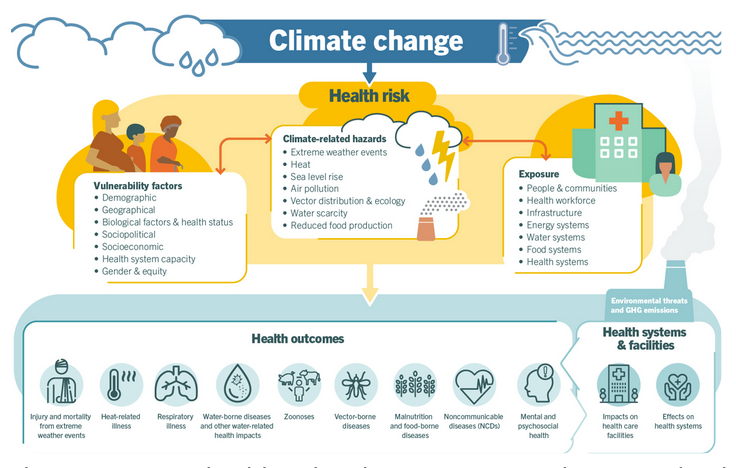Sharm El Sheikh Adaptation Agenda report unveiled at COP28 puts health in the spotlight
By Climate Champions | December 3, 2023
Today, at COP28, the Sharm El Sheikh Action Agenda’s (SAA) first implementation report was unveiled with an emphasis on the intrinsic link between health and climate. The report reflects a deepening understanding of how climate impacts are reverberating through our health systems.
Launched at COP27 in 2022, the SAA initially comprised 30 global adaptation outcomes, targeting 2030 across five priority systems: food and agriculture, water and nature, coastal and oceans, human settlements, and infrastructure. It also included two cross-cutting enablers: planning and finance. As the SAA has evolved, its scope has broadened, with health now included as a critical system, alongside an enhanced focus on water and natural systems due to their overarching influence on resilience across all sectors.
A dedicated chapter on health in the report highlights the urgent crisis posed by climate change on human health. It details both direct and indirect impacts on health systems and facilities, noting that increasing frequency and severity of weather events like heatwaves, storms, and floods exacerbate climate-related health issues, mental health challenges, and strain healthcare services. These risks, disproportionately affecting vulnerable groups such as women, children, and impoverished communities, underline the pressing need for climate resilience in healthcare. The report also points out the deep interconnectivity between health and other systems, showing how climatic shifts disrupt agriculture and food security, escalate waterborne diseases, and pressure infrastructure, underlining the need for a comprehensive and holistic approach in climate adaptation strategies.

Climate-sensitive health risks, their exposure pathways and vulnerability factors. Source: World Health Organization.
A critical section of the report deals with the impact of climate change on agrifood systems and health, highlighting the urgent need to transform how we produce and consume food. Despite an overabundance of calories globally, millions suffer from chronic hunger and lack access to nutritious diets. The report underscores the need for a global shift towards sustainable, locally appropriate diets. It cites the EAT-Lancet Commission, emphasizing a 1.5x increase in the consumption of fruits, vegetables, seeds, nuts, and legumes by 2030. This dietary shift, geared towards plant-based foods, is not only vital for health but also crucial in reducing greenhouse gas emissions and building climate
Another pressing issue highlighted in the report is the critical underfunding in the climate-health nexus. The lack of sufficient finance is identified as a major barrier to implementing national health and climate change plans, especially in low- and middle-income countries (LMICs). The report urges a reevaluation and enhancement of international financial structures to better support climate change and health initiatives.
It also remarks on the increased representation of health in the Nationally Determined Contributions (NDCs) of UN member states, with a rise from 82% to 86%. The inaugural Health thematic day at COP28 and the adoption of a Health impact system within the SAA exemplify the momentum in acknowledging the climate-health nexus. Key initiatives like the Alliance for Transformative Action on Climate and Health (ATACH) have been launched to support the implementation of health commitments made at COP26.
Looking forward, the SAA’s health-focused approach emphasizes the need for robust, climate-resilient health systems. Building these systems requires substantial financial investment, innovative approaches to surveillance and early warning for climate-sensitive diseases, and comprehensive action plans to protect populations from extreme heat. Importantly, the agenda calls for radical collaboration across sectors, recognizing that health resilience is intertwined with broader environmental, social, and economic systems.


